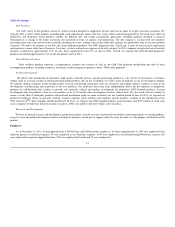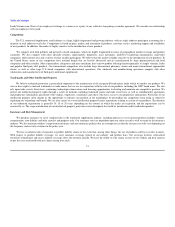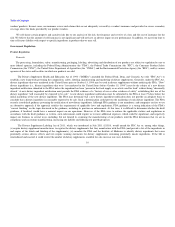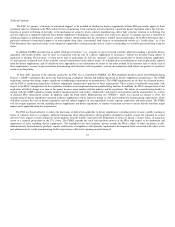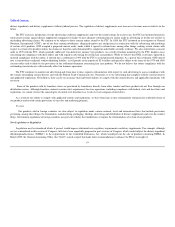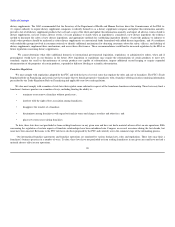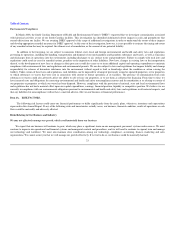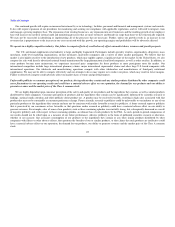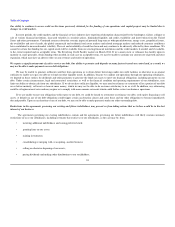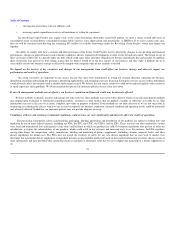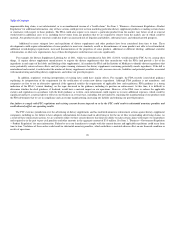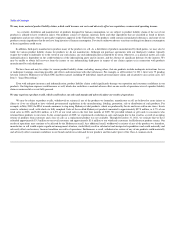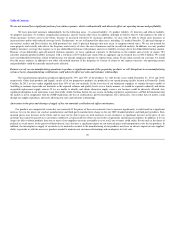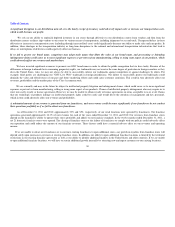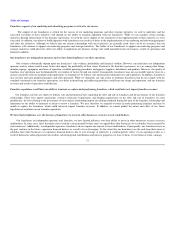GNC 2012 Annual Report Download - page 24
Download and view the complete annual report
Please find page 24 of the 2012 GNC annual report below. You can navigate through the pages in the report by either clicking on the pages listed below, or by using the keyword search tool below to find specific information within the annual report.
Table of Contents
Our continued growth will require an increased investment by us in technology, facilities, personnel and financial and management systems and controls.
It also will require expansion of our procedures for monitoring and assuring our compliance with applicable regulations, and we will need to integrate, train
and manage a growing employee base. The expansion of our existing businesses, any expansion into new businesses and the resulting growth of our employee
base will increase our need for internal audit and monitoring processes that are more extensive and broader in scope than those we have historically required.
We may not be successful in identifying or implementing all of the processes that are necessary. Further, unless our growth results in an increase in our
revenues that is proportionate to the increase in our costs associated with this growth, our operating margins and profitability will be adversely affected.
We operate in a highly competitive industry. Our failure to compete effectively could adversely affect our market share, revenues and growth prospects.
The U.S. nutritional supplements retail industry is large and highly fragmented. Participants include specialty retailers, supermarkets, drugstores, mass
merchants, multi-level marketing organizations, on-line merchants, mail-order companies and a variety of other smaller participants. We believe that the
market is also highly sensitive to the introduction of new products, which may rapidly capture a significant share of the market. In the United States, we also
compete for sales with heavily advertised national brands manufactured by large pharmaceutical and food companies, as well as other retailers. In addition, as
some products become more mainstream, we experience increased price competition for those products as more participants enter the market. Our
international competitors include large international pharmacy chains, major international supermarket chains and other large U.S.-based companies with
international operations. Our wholesale and manufacturing operations compete with other wholesalers and manufacturers of third-party nutritional
supplements. We may not be able to compete effectively and our attempts to do so may require us to reduce our prices, which may result in lower margins.
Failure to effectively compete could adversely affect our market share, revenues and growth prospects.
Unfavorable publicity or consumer perception of our products, the ingredients they contain and any similar products distributed by other companies could
cause fluctuations in our operating results and could have a material adverse effect on our reputation, the demand for our products and our ability to
generate revenues and the market price of the Class A common stock.
We are highly dependent upon consumer perception of the safety and quality of our products and the ingredients they contain, as well as similar products
distributed by other companies. Consumer perception of products and the ingredients they contain can be significantly influenced by scientific research or
findings, national media attention and other publicity about product use. A product may be received favorably, resulting in high sales associated with that
product that may not be sustainable as consumer preferences change. Future scientific research or publicity could be unfavorable to our industry or any of our
particular products or the ingredients they contain and may not be consistent with earlier favorable research or publicity. A future research report or publicity
that is perceived by our consumers as less favorable or that questions earlier research or publicity could have a material adverse effect on our ability to
generate revenues. For example, sales of some of our products, such as those containing ephedra, were initially strong, but, subsequently decreased as a result
of negative publicity and, with respect to those containing ephedra, an ultimate ban of such products by the FDA. As such, period-to-period comparisons of
our results should not be relied upon as a measure of our future performance. Adverse publicity in the form of published scientific research or otherwise,
whether or not accurate, that associates consumption of our products or the ingredients they contain or any other similar products distributed by other
companies with illness or other adverse effects, that questions the benefits of our or similar products, or that claims that such products are ineffective could
have a material adverse effect on our reputation, the demand for our products, our ability to generate revenues and the market price of the Class A common
stock.
22




